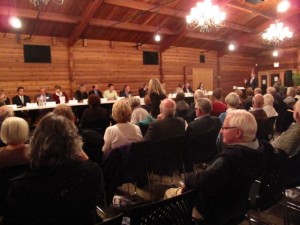Posts Tagged ‘Board of Education’
Who Will Fight For Public Education?
On December 6, Peter Fassbender, the provincial Minister of Education, spoke at the BC School Trustees Association (BCSTA) Academy. It was the first time I had heard him in-person and I found his presentation to be coercive, if not threatening. His central argument seemed to be that in these uncertain economic times Boards of Education must make hard decisions or else face the consequences. I’m still trying to decipher his meaning.
Afterwards, in one of those characteristic quick chats you have at events such as these, another Trustee said to me she felt Minister Fassbender sounded more like the Minister for Small Business and Trade than the Minister of Education. Then she said this: “If you can’t count on the Minister of Education, then who can you count on? Who will fight for public education?”
Why?
Because although there are many passionate advocates who fight for the public education system, decision-making power rests at the table in front of cabinet Ministers and the Premier. And while they may believe in the importance of education, they seem to disavow any notion that the public education system is underfunded or that we have reached a point where school districts are unable to cover additional costs without directly affecting programs and services.
With that in mind, here’s the speech I wish the Minister had delivered to the assembly after Teresa Rezansoff, the President of BCSTA, had welcomed him to the podium and after he had acknowledged our presence on traditional territories.
“Good afternoon and thank you for inviting me to share my thoughts with you today.
When Rod Allen makes his presentation on changes to the BC curriculum, he may tell you that many young people lose their first job because they aren’t able to collaborate well with others. You also know that when we talk about 21st century learning we often focus on collaboration as one of the key skills we want our young people to develop. And you know, as well as I do, that we need to model the skills we want to teach. So, as Minister of Education, I plan to do just that. Over the next four years, I’ll do my very best to ensure that the governance of the public education system in BC is pursued on a collaborative basis.
That’s why I want to start off by thanking you. I want to thank each and every Board for funding the recent wage settlement with support staff. Not only is it incumbent upon us to recognize their hard work with gratitude, it’s important to be able to compensate their efforts with fair wage increases. But I know it was tough to make the necessary adjustments to your budgets and your operational plans and I’m sorry that we weren’t able to provide you with additional resources to cover this cost item. That’s why I want you to know that the next settlement, the one we hope to arrive at with the BCTF in this round of bargaining, will be fully funded. It will be fully funded because I know it would be unreasonable to expect the costs to come out of your budgets as they are currently structured.
With regard to the BCTF, let me say how pleased I am at the tenor of dialogue we’ve been able to establish with Jim Iker and his team at the BCTF since my appointment as Minister of Education. Our relationship is off to a good start and I look forward to continuing to build on that strength. But bargaining is tough. It’s not easy. But let me assure you that while our goal in bargaining is to secure a long-term contract, we also are focused on providing a fair deal. We want a long-term solution to ensure labour peace for students and their families, and to allow the amazing educators we have in this province to focus on the new curriculum, the changes in graduation requirements we hope to introduce, and the new approaches to assessment which will enhance student learning. In other words, we want to make sure that the energies of our educators are directed to the work that they do and not the need to fight with us. That’s collaboration. The end result may be a 10-year deal; it may be something else. We won’t let go of our desire for a long-term solution, but we want our partners to know that our public commitment to a particular time frame will not trump our willingness to bargain in good faith and to secure a fair settlement.
Allow me to make another quick note about bargaining. We will be bringing down legislation in February which will detail a new bargaining structure for the public education sector. The input you’ve provided with regard to what that may look like is very much appreciated. And let me say this: whatever that new structure will look like, it will not, in anyway, compromise the role and status of locally elected school boards. Having locally elected school boards means that local issues can be dealt with in a way that is sensitive to the needs and the wants of each individual community. That makes all the difference to the way public education is delivered at the local level and that’s a point that I’ll be stressing during the core review process as well.
As you know, my cabinet colleague Bill Bennett is in charge of the core review and he is also the Minister of Energy and Mines. Bill has said publicly that there will be no consideration for school districts when it comes to the recently announced BC Hydro rate increases. I realize that increases of this magnitude have become necessary because of decisions made by previous governments and the way in which the government’s relationship with BC Hydro has been structured. We’re working on that, but I want you to know that I plan to sit down with Bill as soon as possible and to push hard to see if there isn’t something we can do to mitigate the impact on you. I need to do that because I know, as well as you do, that any additional costs to your districts without additional funding means an impact on programs and services. And that’s not what we want.
It’s not what we want because even though your resources are stretched to the limit, you’ve done a fine job of making sure our young people are getting the education they need in order to be competitive. You can see that in the OECD PISA results released this week. Isn’t it great how well our young British Columbians are doing compared to other students from around the world? Together, we’ve done a wonderful job and we have to continue to build from this position of strength. We cannot afford to be complacent; we cannot afford to neglect the system that has served us well and which is essential to the continued success of our young men and women.
And that’s why I want you to know that I am sensitive to your challenges. I have read your letters, I have listened to you, and I have heard you. Funding is one of the key challenges facing our public education system because even though we may be spending more than ever before, costs have outpaced the level of funding provided. That won’t do. That’s just not good enough.
That’s why I want you to know that at the cabinet table I am demanding more for education. Yes, I know times are uncertain. Yes, I know the budget is stretched. But I will make it clear to the Premier that if we continue to demand the best from our public education system, we must ensure that the public education system has the means by which to be the best.
Because, like you, I believe that a strong, vibrant public education system is integral to our democratic society. We need jobs, we need a robust economy, but we also need to make sure our society is well-educated so we can maximize the potential of those jobs and that economy for all British Columbians.
Who will fight for public education? I will and you will and this government will because education is a priority — for you, for me, for the children, for all of us, and for the future.
Thank you.”
The Impossibility of Knowing What Is To Be
Here’s the thing: none of us has a crystal ball. Not the pundits nor the prognosticators, some of whom have made very lucrative careers out of saying what they “know” will happen.
In fact, some say the events which shape the human experience are not the outcomes we forecast, but the unexpected occurrences to which we respond. For more on this, read The Black Swan: The Impact of the Highly Improbable by Nassim Nicholas Taleb.
I know I can’t speak to the future with certainty, but as I look towards the fall, I suspect my voice will be a dissenting one.
Why?
Because events are moving quickly in the public education sector with no clear indication of the government’s ultimate objective and yet there seems to be a general complacency about it all.
Here are three red-flag issues for me:
- The removal of the BCPSEA Board points to a profound change in the way bargaining will be conducted in the public education sector. I think BCPSEA paid the price for pursuing a path contrary to the provincial government’s vision. The board’s removal was sudden, swift, and seemingly–and mistakenly in my opinion–unlamented. Whether this is an improvement or not remains to be seen, but I am still looking for assurance that this is not the first step in a series of unilaterally determined shifts which may or may not prove to be publicly beneficial.
- A 10-year labour agreement with the BCTF is seductive and such an easy sell in the court of public opinion. But I’m not convinced, unless the deal is fully funded and increases resources significantly for students, that it can be accomplished in a fair and equitable manner. I am also not convinced that it is in the best interest of the employer as I’ve written about before here.
- Publicly elected school boards make a difference because they represent local interests and are accountable to local communities. The fact that we have a high-performing system today is due in large measure to the way districts (everyone from students to parents to trustees to staff to principals to teachers to support staff) have been able to keep the machine humming despite inadequate funding. Yes, the provincial government spends more per student now than ever before, but add up the costs that have been downloaded without being funded and the increases in expenses which haven’t been covered (including key items such as utility costs, MSP premiums, and carbon offsets) and you’ll see why there’s such a discrepancy. Yes, some boards have run into difficulties, and yes improvements can be made, but the attempt to disregard the government’s role in exacerbating the situation is disingenuous.
So while I may not be able to speak to what the future is bound to bring, I do know that I will continue to speak up and to advocate, even if I’m in the minority, because it doesn’t take a crystal ball to see that a healthy, thriving public education system is the best foundation for all our tomorrows.
A Question of Size
“We may not be big but we’re small!”
As CBC radio listeners know, that’s the motto of the Vinyl Café, the vinyl record store at the heart of Stuart McLean’s storytelling series.
I think the motto counterbalances another common theme of our times: “Bigger is Better”. A concept which often leads to trouble economically, politically, and environmentally.
The Vinyl Café motto is also a good fit for Lions Bay Community School, a primary school in School District 45 which enrolls approximately 60 students per year in kindergarten to Grade 3. A privately run preschool also operates on the premises.
In June, I attended the school’s leave-taking ceremony for its Grade 3s, a ceremony which marks their “graduation” and acknowledges their future status as intermediate students at other schools starting in September.
Lions Bay, it seems to me, is so big in what it does even though it is small.
Why?
Part of it is the setting. Nestled in the forest, the school seems to be swimming in an ocean of green.
Part of it is the architecture. Now over 30 years old, the school is built on an open-concept plan which allows an unparalleled flow between learning spaces and allows the teaching staff an exceptional amount of flexibility.
Part of it is the community. Families who choose to live in Lions Bay have made a specific lifestyle choice and they are active participants in the school because it is a major focus for the community.
There are challenges, too. Because it is so highly dependent on area demographics, enrollment at the school can only be maintained as long as there are young families in the area or willing longer-distance commuters (for example, if Squamish families or Horseshoe Bay residents were to choose the school for their children).
In addition to the excellent teaching staff, the supportive community, and the outstanding physical environment, size is something else that gives Lions Bay an edge. Being small helps the school fulfill its mission statement “to provide a safe learning environment and strive to enable students to become confident learners”.
The size of the school, in my opinion, keeps the student experience at the heart of operations by allowing a higher degree of personal attention. It has also sparked innovation in pedagogical approaches.
These factors have all combined to ensure success for these young students.
Being small can be effective.
Which brings me to the measures being taken to restructure the bargaining framework in BC’s public education system. Measures which I hope are not a prelude to regionalizing or eliminating Boards of Education.
As John Abbott, President of the 21st Century Learning Initiative, cautioned during a visit to West Vancouver earlier this year, losing local governance puts the future of learners at risk by distancing the local community from decision-making.
So here’s what I hope our provincial government and the leadership of BCSTA remember as they work together during the remaining days of summer.
Bigger is not always better.
Artwork by Lions Bay students on display in the gym.
What Does It Mean?
Stepping into a profession, we can expect to be bombarded by acronyms and terms specific to that field. The BC public education system, for example, is rife with them: MoE, BCSTA, BCPSEA, BCSSA, BCASBO, BCTF, CUPE, BCCPAC, HR, F&F, AFG, AbEd, IB, PYP, MYP, IEP, FSAs, standardized testing, needs assessment, self-regulation, special needs, 21st century learning, etc.
Amongst the list of terms is one used to describe the model in which Boards of Education and the provincial government function: co-governance.
But what does co-governance mean?
I decided to look it up and started with the word governance. Here’s what I found:
governance:
- government; exercise of authority; control.
- a method or system of government or management.
And “co-”? It’s apparently a variation of “com-” which is defined as follows:
a prefix meaning “with,” together,” “in association,” and (with intensive force) “completely,” occurring in loan words from Latin (commit): used in the formation of compound words…
Putting the two together, I can say co-governance is a shared exercise of authority, control exerted in association with one another, or a partnership system of government or management.
Defining the term is easy, but applying it to BC’s public education system, as currently structured and operating, may be a misnomer.
Why?
Because the inherent nature of the relationship is one of imbalance. Public education is financed by public revenues which are allocated by the province.
And if one party in a relationship is the ultimate arbiter of funds, then it may be a challenge to ensure that other critical issues are addressed on the basis of a co-governance model. In the past few weeks alone, we’ve seen the release of a 10-year framework for bargaining as well as the debut of a new website, mostly with little or no direct consultation with Trustees.
I’ll admit it’s not easy when one has a firm grasp of the purse strings to share control, but the current structure is paternalistic and does not lend itself easily to a co-governance model.
And while my call for a Royal Commission on Education is likely to continue falling on deaf ears, here are two things I’d like to see.
First, I would like all eligible voters in BC to vote in the May 14 provincial election no matter what their political persuasion.
Second, I would like the new government, whether Liberal, NDP, Green, Conservative, or other to convene a meeting with Board of Education Trustees. Maybe two from each district. That’s a group of 120 people.
And talk.
Have a real discussion.
A substantive discussion.
One where Trustees do most of the speaking and elected officials and Ministry representatives do the listening.
And then do the same with each significant group in the education sector.
Compile the results of these discussions, distribute the report, and then put everyone in a room together to see if we can work together to ensure that our children will continue to benefit from a vibrant and thriving public education system.
One that is not characterized, if I may borrow from the philosopher Hannah Arendt, by questions of “what are we fighting against”, but “what are we fighting for?”.
And let’s see, if through dialogue, we can put the “co-” back into “co-governance”.
Crazy Little Thing Called Twitter And The FSAs
At first I lurked.
I’d log on to Twitter.com and scroll through the streams, fascinated.
I started to tweet in support of my campaign during the 2011 civic election and now it’s part of my daily routine.
With Twitter, I keep an eye on my community. I get news from around the world. I read analyses of issues and events from different perspectives. I interact with well-known figures and people in faraway places, opportunities I may never have had otherwise.
Twitter is also ugly at times, “nasty, brutish, and short” in the words of Thomas Hobbes. And while it is liberating to talk to so many so easily, Twitter is also constraining.
Why?
My Twitter account is a mirror of who I am as a whole person, but that whole person includes being a public figure. I have to be aware that although I am speaking personally, some may mistakenly take my views as those of the West Vancouver Board of Education. I have to be aware that while I distinguish between the different hats I wear in life and the various roles I play, others may not.

Which brings me to the Foundation Skills Assessment (FSAs), a test administered to Grade 4 and Grade 7 students throughout British Columbia.
Twitter streams were on fire about the FSAs recently, but I kept mum. I felt that whatever I said in 140 characters could be mischaracterized.
Here’s some of what I wanted to say.
As a parent, I had no objection to my child writing the FSA. As a Trustee, I see value in the data collected because it can be used to align resources with demonstrated need.
Here’s the problem: what we want the FSA to do and what is done with the FSA results have diverged.
FSA data, in addition to use by the provincial government and by school districts, is used by a third-party organization to rank schools.
The Fraser Institute rankings are myopic: they claim to present an overall picture of a school, but the rankings seem to be unduly weighted on one factor, FSA scores.
Rather than the FSA, why not invest in developing literacy screeners for key grades, the results of which would be privately held and exclusively used by the school, the district, and the student’s family? I’m thinking of something like the early literacy screening used for kindergarten students in West Vancouver.
And while I acknowledge that provincial measures are needed for accountability purposes, perhaps a better method of tracking student performance could be determined through a consultative process with key partner groups.
Perhaps by separating the two requirements — diagnostic and reporting — and by creating mechanisms for each, we would be spared the yearly rankling spectacle of school rankings.
At our January public board meeting, Sandra-Lynn Shortall, District Principal – Early Learning, paraphrased a conversation she’d had with Dr. Stuart Shanker. “Early intervention,” she said, “is not the answer to helping students address their needs, rather it’s continuous intervention and connectedness.”
Just as Twitter is not always the best mode of communication, the FSA may not be the best mechanism to match vulnerable or struggling students with the continuing supports they need to succeed in our public education system.
I think we can do better.



